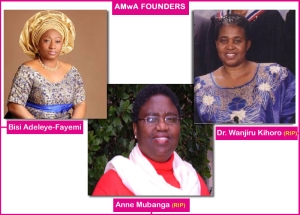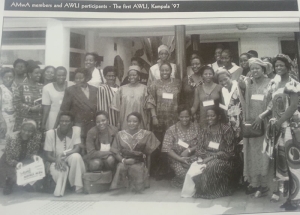 The birth and growth of AMwA
The birth and growth of AMwA
Wanjiru Kihoro founded Akina Mama Wa Afrika in 1985; this was possibly the first organization of its generation to focus on African women. By the 1980’s there was a thriving black feminist movement, but it was AMWA that provided a venue for pursuing the particular concerns of women from the African continent who found themselves residing in London.
AMWA responded to the fact that 1980’s London was full of African political exiles and refugees AMWA’s founder Wanjiru, herself was a Kenyan exile, already internationally known both for her own activism against the dictator Arap Moi, and for her role as a key figure in the global campaign for the release from detention of her husband Wanyiri Kihoro, one of Amnesty International’s prisoners of conscience.
The pan-African politics of AMWA have characterised it since inception. This can be seen in the composition of the earliest members of the London organization.
Many members came and went, reflecting the mobility of exile community, and the transience of overseas students. By 1988 AMWA was already established as a small voluntary organization that proceeded to organize a series of successful events, and launch a journal ‘African Woman’. Operated out of a small office located in the Women’s Centre at number 4 Wild Court, just metres away from the Africa Centre in the heart of Covent Garden, the perfect venue for public events. The AMWA office was supported with modest funding from the Camden City Council, and used these resources to hire a coordinator to support the work of a small, entirely voluntary membership.
However, it soon became clear that AMWA’s scope was too wide. Not only were the founders seeking to address interests of women living in the growing communities of African’s in Europe, but also the situation of women across an entire continent that was increasingly being plunged into crises. Liberation wars were ending in Southern Africa, and the winds of change were sweeping the already independent nations, as democratization movements began to push back against authoritarian regimes. Women were facing a whole new era of challenges, as a result of the imposition of structural adjustment programs that were decimating the public services. Several of AMWA’s members were making plans to leave an increasingly unwelcoming Europe, and to head home to continue the struggle, and specifically to address the deferred matter of women’s liberation.
It was in this context that Bisi Adeleye-Fayemi, who was then the Coordinator of AMWA, took a decision to transfer AMWA head office to Africa, Uganda in 1997. It was to be a vehicle that would focus on the situation of women at home countries on the African continent once that would retain the transcontinental connections, so that all could benefit from maintaining the solidarity they had established in London, to grow and deepen this across diverse social and political realities.
AMWA was both transnational and pan-African. The intent was for the London office to mobilize resources that would support the initiation of work on the continent. Some of the members were embedded in movements that were nation-based and had limited willingness to address the question of women’s liberation. AMWA members were united by their strong commitment to improving the status of women in African contexts. AMWA was unapologetically feminist whereas most other organisations avoided political ideologies in the interests of solidarity. This was at a time when only a few people would publically identify themselves as feminists; the dominant discourse was a developmentalist one that would attend to women’s interests expediently – not because of any moral or political commitment, but more acceptable as a benefit to development goals. It was an approach that evaded confronting male power and the domination of masculinity in African movements and political structures, but sought to strengthen women and men under the rubric of “lifting others as we climb”.
Over the years, AMWA gained credibility across the region, becoming well known in several countries, pursuing intensive training and capacity strengthening programmes dedicated to supporting political and policy advocacy work that would ratchet up gender policy and the capabilities of women. AMWA’s work has produced significant results in many African countries especially in the key areas of gender, sex and sexuality, governance and leadership and in bringing gender analysis into organisational development which had been extremely male dominated.
Ideology
During the early days, conversations centred on establishing the identity and framework of the organization. It was deemed important for AMwA to state its position/values strongly and give others a chance to agree or resist. The conversations led to the branding of AMwA as a feminist organization. AMwA’s framework of analysis became feminist analysis. The organization was willing to travel with all the sisters while it politicised and created awareness about the importance of having a clear stance but was also ready to respect the views of those who did not believe in feminism. Indeed at this stage, some sisters who believed that feminism was “Un-African” dropped out of the organisation.
Establishing the Renowned African Women Leadership Institute (AWLI)
 The first AWLI was held in 1997
The first AWLI was held in 1997
Prior to the establishment of the AWLI between 1996 and 1997, AMwA operated mainly as a charity based organisation supporting African women living in the UK.
Around 1985 there were many African Women living in the UK as students, professionals, migrants, refugees etc. They felt it was important for them to come together to provide support for themselves in a hostile foreign land and environment. They also wanted to sustain the links that they had with the social and political movements that they had been involved with. Some of them had been part of the Liberation struggles and some were part of the women’s movement and they wanted to sustain those links they had left behind on the continent.
AMwA realised the importance of developing an eye for new leadership and building on what was already there. And so it was that in 1995, AMwA led a delegation of young women to the Women’s Conference in Beijing. At this time, AMwA conducted a study to understand the challenges of young African women. The results of the study reflected that women on the continent did not have opportunities to express their ideas and no spaces to horn their skills.
So, after the years AMwA evolved along two lines; i.e. providing support for African Women in the UK and progressively African Women in Europe. The support they were giving to women on the continent was mainly through organising conferences every other year and sourcing some funding to allow active women’s representatives from the continent to attend international conferences but we felt that was not enough.
In 1996 AMwA’s Director then Bisi Adeleye-Fayemi, Everjoice Win and Stella Mukasa the then President of AMwA conceived the idea of organising a Leadership Institute. At the time, leadership institutes existed in other parts of the world but not Africa. Bisi pledged to take the leadership institute to Africa. Again, demonstrating how AMwA was taking charge of its own agenda. The first AWLI was then held in 1997 for three consecutive years in Kampala, Uganda, and Accra Ghana.
At the beginning the founders wanted to run the AWLI as a pilot for 3 years with the aim of securing a core group of African women on the continent preferably young African feminists who can define a more progressive agenda. They wanted to popularise the concept of women’s leadership. “The AWLI was actually the first program to come out and actively to define women as leaders. It was after AMwA started running the AWLI, naming women in the same sentence with leadership, that other programmes started emerging with similar concepts” Bisi narrates.
In setting up the AWLI the founders wanted to ask critical questions about who we are as women, what tools we bring to the women’s movement. What is our entry point and what are the things we would and would not take for granted. We wanted to build a feminist movement that was our agenda and has been since 1997.
Embracing and mentoring young people
AMwA realised the importance of developing an eye for new leadership and building on what was already there. And so it was that in 1995, AMwA led a delegation of young women to the Women’s Conference in Beijing. At this time, AMwA conducted a study to understand the challenges of young African women. The results of the study reflected that women on the continent did not have opportunities to express their ideas and no spaces to horn their skills. This led to the concept of creating a Leadership Institute for young women. At the time, leadership institutes existed in other parts of the world but not Africa. AMwA’s Director pledged to take the leadership institute to Africa. Again, demonstrating how AMwA was taking charge of her own agenda.
Establishment of AMwA office in Africa
In 1996, a regional office was established in Kampala, Uganda and would eventually serve as the main office for all of Africa and Europe. In February of 1997, the first leadership institute was conducted by AMwA. Today the institute has trained over 6000 alumnae through African Women’s Leadership Institute (AWLIs). Initially, AMwA received feedback from donors claiming that the creation of a leadership institute was elitist and did not respond to the needs of women on the ground. It was clear that a funding organisation – an African Women’s fund- that supported and funded authentic ideas and programmes was needed- an implicit picture of an African women’s fund begun to emerge.
Birthing of AWDF
In 2001, two women (Hilda Tadria and Joana Foster) who had been thinking about an African Women’s Fund and had actually written a funding proposal, joined forces with AMwA (Bisi Fayemi) and the African Women’s Development Fund was born. The fund has created transformation in the discourse on what is funded, by whom, where, when and how much.
Breaking silences on sexual rights
In 2005, AMwA organized the women’s rights play “The Vagina Monologues.” This received much controversy as an affront to public morality. The play was eventually banned by the government based on what was described as offensive language, vulgarity and the supposed promotion of homosexuality. Nevertheless, AMwA succeeded in breaking silences on issues of sex and sexuality. Later on, AMwA broke new ground by being one of the first organisations to organize Community Based Organisations working with sex-workers and Lesbian, Gay, Bisexual and Queer women to capacitate them in various ways. AMwA also created the space for them to document their stories; it made them visible. When what came to be known as the Bahati bill was introduced to parliament, AMwA took a stance by supporting resistance initiatives that grew into a Coalition
African and Uganda Feminist Forums (AFF and UFF)
Prior to the establishment of ‘The African Feminist Forum’ in 2006, AMwA was part of the first consultations on the establishment of the Forum as well as a member of the working group. AMwA hosted the AFF successfully and was responsible for organizing and supporting a series of Uganda Feminist Forums that it hosted for three years. Today Uganda is in the process of organizing its 7th Feminist Forum.
AMwA offices as the centre of feminists and women’s rights activists
For a long time, AMwA’s board room was regarded as a space for all women’s rights activists and feminist. Whoever wanted a working or reflective space used it.

